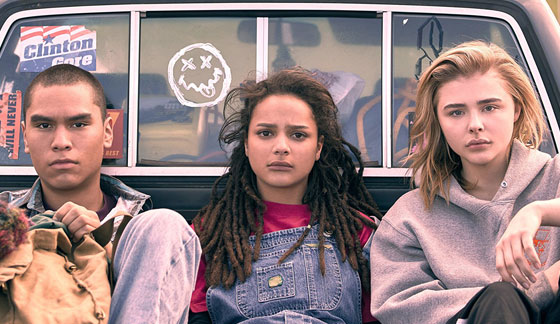Desiree Ahkavan’s new film, The Miseducation of Cameron Post hits theaters this week after both winning the Grand Jury prize for drama at Sundance Film Fest and screening at the Tribeca Film Festival earlier this year. The film, an adaptation of Emily Danforth’s 2012 novel, stars Chloe Grace Moretz as Cameron Post, a high school girl who is caught making out with another girl on prom night. Cameron is subsequently sent to a religious gay “conversion therapy” camp called God’s Promise by her conservative American family. From there, Ahkavan’s touching and honest film follows Cameron as she encounters her fellow campers coping with their sexualities and the camp counselors (Jennifer Ehle and John Gallagher Jr.) who may have their own inner reservations about the work that they do. It is a challenging film for its young stars that’s deftly led by Moretz with support from Sasha Lane, and Forrest Goodluck.
I got to speak with some of this talented cast at their Tribeca red carpet premiere about how they came to be in the film and the message believers in these controversial camps could take away from Cameron’s story.
Tony winner John Gallagher Jr. plays Reverend Rick, himself a former camper turned youth counselor who outwardly is a God’s Promise “success” story but clearly deals with suppressing his true emotions.
Lauren Damon: Your character has so much going on under the surface, how did you work on playing him?
John Gallagher Jr: Yeah! A lot of it was just trusting the script and trusting Desiree. You know it was a very complicated role who’s living right on the edge of something. And I just really looked to [Desiree] to kind of be the leader and to be my guide throughout all of it. And to just try and kind of tell the truth as we had deemed it fit for the film.
LD: What was the most difficult part of working on this?
JGJ: I think, you know living on that edge…of like really preaching something that, I think you start seeing throughout the film, that the character may or may not actually even believe. And that kind of crisis of faith, and that doubt and that second guessing. And really like the guilt that comes with that…I think he’s a guy that really is struggling to do what he believes is the right thing. And I think that his awakening in the film is that he doesn’t know what the right thing is.
LD: I watched this in an admittedly liberal NYC screening room and I think the reactions to a lot of what happens in the camp was that it was ridiculous, but both in the film, and in these real places, it’s really not…
JGJ: It’s not. There is no spin on it, that is their earnest belief. And as I can’t even fathom having that kind of opinion on matters of sexuality, that’s a very real thing. And people do have those exact kind of beliefs.
LD: What would you tell someone with these kinds of beliefs if you could speak to them?
JGJ: Gosh. I would tell them to watch this film and think it over a second time, you know?
Quinn Shephard plays the small but crucial role of Coley Taylor, the girlfriend who Moretz’s Cameron is caught with before she is sent for conversion.
LD: Your role isn’t big in terms of screentime, but it’s so pivotal to the film, how was it to know that going in?
Quinn Shephard: It was great! I was very happy to be a part of the film in any way possible. I keep saying, I just wanted to be a part of the movie because I really believed in it. I think it’s one of the best scripts I’ve ever read and I wanted to be in it. And I’m excited that I got to play this role.
LD: As in actress in this film, if you could get a message to people who believe these camps are effective, what would it be?
QS: Oh man. I think it’s like…I mean, look–Some people I think have a lot of fears and they justify things like conversion camps out of fears. But I think that if you come at something from a place of love, it’s impossible to justify. I think if you’re really someone who feels love in your heart and you challenge yourself to love someone who’s gay and imagine…putting that person through that and telling them that they’re not okay, I think it’s impossible to justify. I think people get caught up in their rhetoric and they get up in religious justification. But when it’s human and it’s in front of you, it’s very hard to agree with, you know? And I think that if somebody sits through this movie who believes in it, they’ll change their mind.
LD: How did you go about preparing for the intimate scenes between Coley and Cameron?
QS: I read the book, I read about my character…I’m somebody who’s very comfortable with who I am and it was just about creating a place in myself where I was very happy for what was happening, but at the same time very ashamed of it. I think that’s who [COLEY] is, she’s that duality and that was a difficult place for me to go. It was a very sad place. But it was something that was very important to her. There was a fragility to the relationship because she is not okay with it yet. And then I think as far as the actual intimacy of the scene, we just went into it was a sense of humor. And Desiree was very accommodating and she made us very comfortable and we had fun.
The Miseducation of Cameron Post opens in New York on August 3rd and expands to LA and other cities on August 10th.


